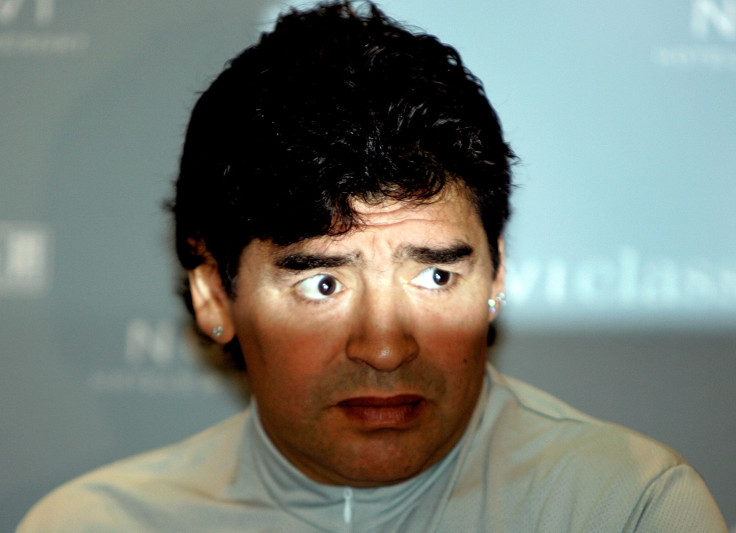VIDEO Diego Maradona 86: Remembering The Legend As Argentina Returns To World Cup Final

In a less than entertaining semifinal, Argentina defeated the Netherlands in a penalty shootout in Sao Paulo on Wednesday. After years of underachieving since the retirement of legend Diego Maradona, Argentina will play for the World Cup title against the same foe from their past two World Cup appearances.
In Italy, the very country where he was starring as a club player for Napoli, Maradona missed out on repeating as World Cup champions in 1990 when Argentina was denied by a 85th-minute penalty goal from Andreas Brehme of Germany, 1-0. Four years earlier in Mexico, Maradona was part of an Argentina squad that defeated West Germany, 3-2. It is the 1986 World Cup that remains firmly entrenched in the minds of Argentina football supporters.
While Maradona played in the 1994 World Cup, he was well past his prime, yet Argentina still reached the Round of 16. Argentina would not advance beyond the quarterfinals since. Decades of disappointment have finally come to an end with Wednesday's victory, prompting memories of one of the greatest players in history.
With Argentina back in the final in Rio de Janeiro, the image of Maradona’s greatness quickly jumps to mind. Few players have gained more fame for one World Cup than Maradona in 1986. He won the Golden Ball as the best player in the tournament after scoring or assisting on 10 of Argentina’s 14 goals.
In the second half against England in the 1986 quarterfinals, Maradona scored two goals of equal amazement, but for much different reasons. In the 51st minute, Maradona clearly punched a high ball in the penalty box when challenged by goalkeeper Peter Shilton, who towered over Maradona. The ball found its way into the net, and would not be overturned by Tunisian referee Ali Bin Nasser despite the fierce and justifiable protests of the English players. It was utterly shocking that such a goal was allowed, and English supporters have been quick to point that out several years later.
There was no debate about Maradona’s second goal, which came four minutes later. With the ball in Argentina’s defensive half, the attacking midfielder raced and weaved his way through the English defense to score arguably the greatest goal in World Cup history. If there was any doubt that Maradona was the star of the 1986 World Cup, it was put to rest with that dazzling display.
Maradona would add two more goals in the semifinal against Belgium, but would be held scoreless in the final. However, his impact in Mexico was undeniable. After a relatively quiet performance as a 21-year-old in 1982, Maradona was a superstar by the mid-1980s. His dribbling skills and creativity were well above any of his peers, and his fame would rise with Napoli, as he teamed with Brazilian forward Careca to lead the club to glory in Serie A.
Since officially retiring in 1997, Maradona has been in and out of the spotlight, often for the wrong reasons. The 53-year-old has battled substance abuse and weight problems. He has also openly feuded with Brazil legend Pele.
In recent years, Maradona has lost a considerable amount of weight and recently stated that he is 10 years sober.
In 2010, Maradona would coach Argentina to the World Cup quarterfinals in South America, where they were trounced by Germany, 4-0. It was a particularly painful loss considering the match was outside of Europe, and since there was a great deal of optimism surrounding Argentina due to his grand influence over the players.
The 2010 squad featured current superstar Lionel Messi, a player who Maradona has openly praised and who some experts believe still plays in Maradona’s shadow. The roster also included current forward Sergio Aguero, who at the time was married to Maradona’s daughter, though the couple separated in 2013. Both players are expected to be in the starting lineup against Germany on Sunday.
Maradona continues to be a presence for Argentina football. Last week, he told Venezuelan television that the current squad relies too much on Messi, and the team lacks rhythm. Maradona was also quick to bash rival Brazil on Tuesday for their humiliating 7-1 defeat against Germany in the semis.
"I said Germany were better than Brazil, I didn't like Brazil from the start, but I didn't think Germany were going to be so imposing, so devastating, so decisive," Maradona said.
"Brazil just didn't turn up and I think the worst thing for Brazil is that they gave an extremely poor image. OK, Germany were strong but the Brazil players simply weren't on the pitch."
Argentina gets a chance to one up their neighbors when they face Germany at the famed Maracana Stadium. The odds are greater that Argentina will put up a better fight than Brazil, though the Germans will be favored.
When the two countries kick off, Maradona will be on many viewers’ minds. He is linked to Germany as an opposing player and coach, and in some ways his legacy is on the line due to Messi's growing prominence.
Messi scored four goals in group play, but has been held scoreless in the knockout stage. While Messi coolly delivered the first penalty goal of the shootout against the Dutch, he has been relatively quiet in recent games.
All that could change against Germany. Should Messi play a major role in leading Argentina to the ultimate prize his reputation will skyrocket, as many will consider him the greatest Argentine player ever. As a result, Maradona’s heroics in 1986 may lose some of its luster.
Until then, Argentina will likely continue to honor Maradona as a larger-than-life icon.
© Copyright IBTimes 2024. All rights reserved.






















